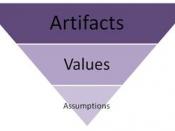Abstract
In this paper, I will take a look at some of the terminology and concepts associated with organizational behavior, organizational culture, diversity, communication, effectiveness and efficiency, and learning.
Organizational Behavior
Organizational behavior has been defined as the systematic study of the action and attitudes that people exhibit within organizations or companies. These attitudes and actions need to be shared with everyone within the organization in order for the organization to succeed. From top to bottom, everyone needs to be involved and exhibit the right actions and attitudes for an organization to excel. Some of the challenges and opportunities for organizational behavior include: improving quality and productivity, managing workforce diversity, improving ethical behavior, responding to globalization, declining employee loyalty, empowering people, and stimulating, innovation, and change.
Organizational Culture
Organizational culture is defined as a system of shared meaning held by members that distinguish the organization from other organizations. Cultures are known for: innovation and risk taking, attention to details, outcome, people, and team orientation, aggressiveness, and stability.
Some of the functions of organizational cultures include: to convey a sense of identity for organization members, to facilitate the generation of commitment to something larger than one's individual self-interest, to enhance social system stability, and it serves as a sense-making and control mechanism that guides and shapes the attitudes and behavior of employees.
Diversity
As with anything there are advantages and disadvantages when it comes to diversity. Some of the advantages of diversity are: lower costs and higher employee attitudes or morale, improved recruiting efforts, increased sales, market share, and corporate profits, increased creativity and innovation, and increased group problem-solving and productivity. Some people may have some resistance and those reasons may vary but they include: perceived limits to decision-making autonomy, perceived fears of reverse discrimination, a fear of change, a denial...


